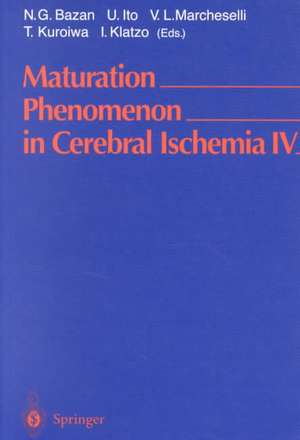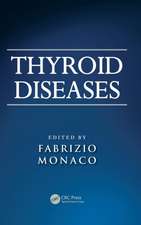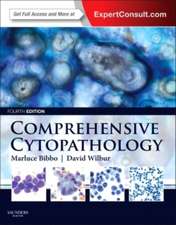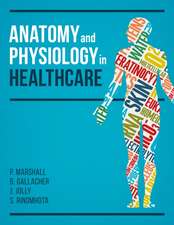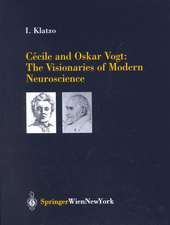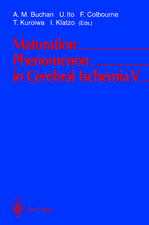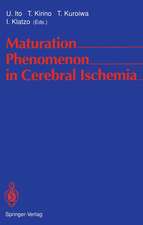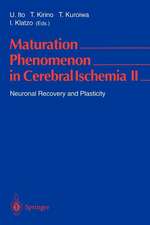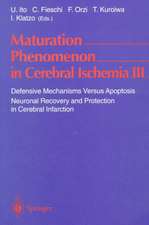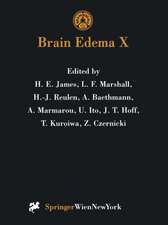Maturation Phenomenon in Cerebral Ischemia IV: Apoptosis and/or Necrosis, Neuronal Recovery vs. Death, and Protection Against Infarction
Editat de N. G. Bazan, U. Ito, V. L. Marcheselli, T. Kuroiwa, I. Klatzoen Limba Engleză Paperback – 26 mar 2001
Preț: 716.09 lei
Preț vechi: 753.77 lei
-5% Nou
Puncte Express: 1074
Preț estimativ în valută:
137.03€ • 143.43$ • 114.05£
137.03€ • 143.43$ • 114.05£
Carte tipărită la comandă
Livrare economică 31 martie-14 aprilie
Preluare comenzi: 021 569.72.76
Specificații
ISBN-13: 9783540411079
ISBN-10: 3540411070
Pagini: 302
Ilustrații: XVI, 284 p. 54 illus.
Dimensiuni: 155 x 235 x 16 mm
Greutate: 0.43 kg
Editura: Springer Berlin, Heidelberg
Colecția Springer
Locul publicării:Berlin, Heidelberg, Germany
ISBN-10: 3540411070
Pagini: 302
Ilustrații: XVI, 284 p. 54 illus.
Dimensiuni: 155 x 235 x 16 mm
Greutate: 0.43 kg
Editura: Springer Berlin, Heidelberg
Colecția Springer
Locul publicării:Berlin, Heidelberg, Germany
Public țintă
ResearchCuprins
I The Role of Genetic Expression and Apoptosis.- A Role for the GTPase Pathway in Neuronal Damage After Cerebral Ischemia: the Impact of the DNA Array Technique on Stroke Research.- Induction of Hypoxia-Inducible Factor-1 (HIF-1) in Adult and Neonatal Rat Brain: Possible Relationship to Hypoxia-Induced Tolerance to Ischemia.- Characterization of the eIF2-Associated Protein p67 During Brain Ischemia and Reperfusion.- Is DNA Methylation Deleterious in Cerebral Ischemia?.- Distinct Ischemic Effects on HSC70, HSP72, and c-fos Expression in Young and Adult Gerbils.- Bcl-w Expression and Localization in Brain Ischemia.- II Factors Modulating Neuronal Plasticity and Course of Maturation Phenomenon in Cerebral Ischemia (Metabolic and Inflammatory Factors).- Thrombosis After Ischemic Stroke-Platelet Aggregation.- The Role of the Immunophilin FKBP12 in Cerebral Ischemia.- Localization of Macrophage Migration Inhibitory Factor in the Brain Following Focal Cerebral Ischemia in the Rat.- Environmental Influence on Neuronal and Dendritic Spine Plasticity After Permanent Focal Brain Ischemia.- Relationship Between DNA Fragmentation, Energy State, and Protein Synthesis After Transient Focal Cerebral Ischemia in Mice.- Changes in Postsynaptic Densities After Brain Ischemia.- Functional Plasticity of the Brain After Ischemic Injury Assessed by Near Infrared Topography.- III Factors and Mechanism Enhancing Susceptibility or Tolerance (Growth Factors).- TNF-? and Ceramide as Mediators of Neuronal Tolerance to Brain Ischemia.- Upregulation of Transforming Growth Factor-Beta 1 Expression in Rat Hippocampal Neurons After Transient Forebrain Ischemia and After ?2-Adrenoceptor Stimulation.- Bcl-2-Protein Is Upregulated After Chemical Induction of Ischemic Tolerance Using 3-Nitropropionic Acid in Rats.- Time Course of Postischemic Stroke Symptoms and Delayed Infarction After Transient Cerebral Ischemia in Gerbils: Effect of Chemical Preconditioning Using 3-Nitropropionic Acid.- Cyclic AMP Response Element Binding Protein Phosphorylation May Be Closely Associated with Neuroprotective Mechanisms After Focal Ischemia in Rat Brain.- Recent Evidence on the Neuroprotective Effects of Pituitary Adenylate Cyclase-Activating Polypeptide.- Evolution of Microcirculatory Derangement in Focal Ischemic Penumbra Following Pial Arteriolar Occlusion as Observed by the Novel Photoelectric Method.- IV Ischemic Infarction: Threshold, Experimental and Clinical Dynamics and Therapeutic Design for Prevention and Reduction of Intensity.- Delayed Maturation of Cortical Infarction: Role of Caspases and NF-AKB-Mediated Transcription.- Cellular Components with Adaptive Responses Contributing to Expansion and Repair Process of Ischemic Brain Damages Caused by Major Vessel Occlusion.- Combination Drug Therapy and Mild Hypothermia: Comparison with Neurosurgical Standard Regimen in a Rat Model of Reversible Focal Cerebral Ischemia.- Thrombolysis in Acute Stroke.- V Mitochondrial Role in Ischemic Cell Death.- Cytochrome c Is Released from the Mitochondria of Vulnerable Hippocampal CA1 Neurons in Rats After Transient Global Cerebral Ischemia.- Formation of 4-Hydroxy-2-Nonenal-Modified Proteins in the Rat Brain Following Transient Global Ischemia Induced by Cardiac Arrest and Resuscitation.- Mitochondrial Dysfunction and Maturation of Brain Damage After Transient Ischemia.- Hypoxia-Induced DNA Damage in the Rat Brain.- Ultrastructure and Morphometry of Astroglial Mitochondria Following Temporary Ischemia.- VI Special Lecture.- Translating Experimental Stroke Research into the Clinical Arena.
Caracteristici
Includes supplementary material: sn.pub/extras
Descriere
Fourth International Workshop, October 30-November 3, 1999, New Orleans, Louisiana, USA
